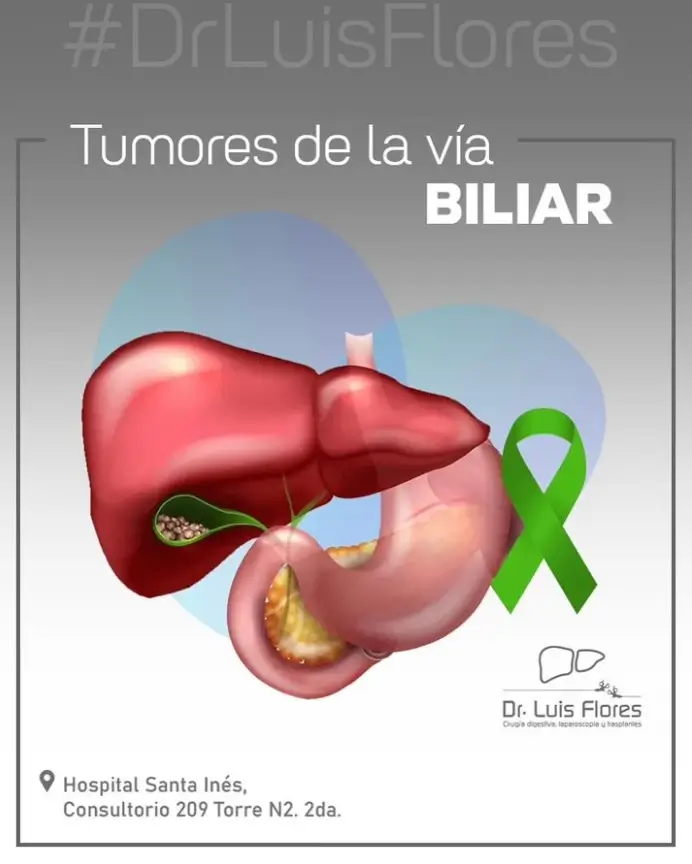Introduction
Biliary tract tumors are a group of neoplasms that can affect the bile ducts, which are responsible for transporting bile from the liver to the small intestine. Although relatively rare, their diagnosis and treatment can be complex. This article, aimed at the patients of Dr. Luis Flores, a general and digestive surgeon in the city of Cuenca, provides a detailed understanding of the types, symptoms, causes, diagnostic methods, and treatment options for biliary tract tumors. More Information!!
Types and Categories
Cholangiocarcinoma
Cholangiocarcinoma is the most common type of malignant biliary tract tumor. It originates in the cells of the bile duct and can develop anywhere in the biliary system, including the intrahepatic and extrahepatic ducts.
Benign Tumors
Although less common, benign tumors of the biliary tract, such as adenomas and biliary cysts, can also occur. While non-cancerous, they can cause obstruction and other symptoms requiring medical attention.
Symptoms and Signs
Jaundice
Jaundice, characterized by the yellowing of the skin and eyes, is a common symptom of biliary tract tumors. It is caused by the accumulation of bilirubin in the blood due to the obstruction of the bile ducts.
Abdominal Pain
Pain in the upper right part of the abdomen can be a sign of biliary tract tumors. This pain can vary in intensity and is often accompanied by other symptoms such as nausea and vomiting.
Causes and Risk Factors
Chronic Liver Diseases
Chronic liver diseases, such as cirrhosis and hepatitis, increase the risk of developing biliary tract tumors. These conditions cause inflammation and damage to the liver and bile ducts, creating an environment conducive to tumor development.
Genetic Factors
A family history of biliary tract cancer can increase the risk of developing this disease. Specific genetic mutations may also play a role in the predisposition to these tumors.
Diagnosis and Tests
Endoscopic Ultrasound
Endoscopic ultrasound is a technique that combines endoscopy and ultrasound to obtain detailed images of the bile ducts. This test allows for direct visualization and biopsy for accurate diagnosis.
Endoscopic Retrograde Cholangiopancreatography (ERCP)
ERCP is a procedure used to examine the bile and pancreatic ducts. During ERCP, contrast dye is injected into the bile ducts, and X-rays are taken to identify obstructions or tumors.
Treatment Options
Surgery
Surgery is the primary treatment for biliary tract tumors, especially if they are malignant. Surgical resection of the tumor and affected parts of the bile duct may be necessary to completely remove the neoplasm and prevent its spread.
Adjuvant Therapy
After surgery, adjuvant therapies such as chemotherapy and radiation therapy may be used to destroy remaining cancer cells and reduce the risk of recurrence. These therapies help improve treatment outcomes and long-term survival.
Preventive Measures
Control of Liver Diseases
Properly managing and treating chronic liver diseases can reduce the risk of developing biliary tract tumors. It is crucial to follow a recommended treatment plan and attend regular check-ups.
Healthy Lifestyle
Adopting a healthy lifestyle, including a balanced diet, regular exercise, and avoiding excessive alcohol consumption, can help maintain liver health and reduce the risk of biliary tract tumors.
Personal Stories and Case Studies
Ana’s Case
Ana, a patient of Dr. Flores, was diagnosed with cholangiocarcinoma after experiencing jaundice and abdominal pain. Following an ERCP and biopsy, the diagnosis was confirmed, and surgery was performed to remove the tumor. Ana received adjuvant therapy, and thanks to early detection and proper treatment, she is now in remission.
Pedro’s Case
Pedro, another patient of Dr. Flores, had a history of liver cirrhosis and developed a biliary adenoma. Although the tumor was benign, it caused significant obstruction and symptoms. Pedro underwent surgery to remove the adenoma and has experienced a full recovery without further complications.
Expert Insights
Dr. Luis Flores
Dr. Luis Flores emphasizes the importance of early detection and multidisciplinary management of biliary tract tumors. He recommends his patients undergo regular check-ups and maintain open communication with their medical team about any new or persistent symptoms.
Conclusion
In summary, biliary tract tumors are complex conditions that require appropriate medical attention to ensure effective diagnosis and treatment. It is crucial to be aware of the symptoms and undergo regular check-ups to detect any abnormalities early. If you experience symptoms related to biliary tract tumors, seek medical attention and discuss the best treatment options with a trusted professional like Dr. Luis Flores in Cuenca.





